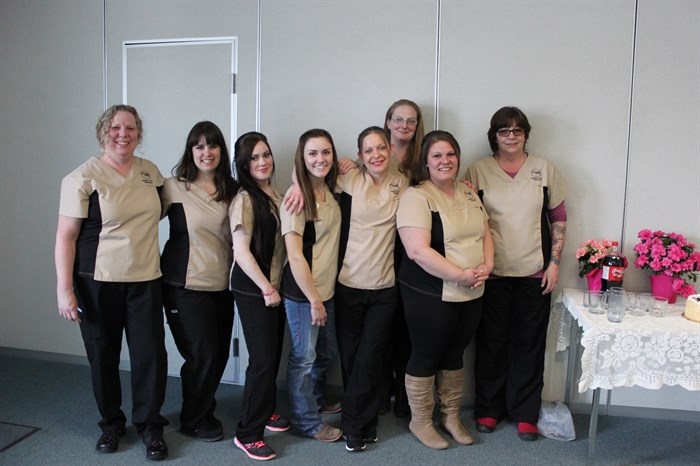
Health Care Assistants students
Image Credit: SUBMITTED
March 29, 2017 - 2:52 PM
Aging populations and retirements among baby boomer health care workers could spell a shortage of Health Care Assistants (HCAs) in many B.C. communities over the next decade.
A special one-time intake of Okanagan College’s HCA program completed in Princeton recently and is already opening doors to health care careers for students in that community.
Natasha Smith has dreamt of a career in health care for more than fifteen years. On March 16, she became one of eight students to complete the program in Princeton.
A mother of three school-aged children, Smith says the hour-plus commute to the Okanagan College’s Penticton campus where the program is also offered, is not feasible for her. So when she learned the College would be offering an intake of its HCA program right in her hometown, she jumped at the chance.
“Being able to attend classes and secure practicum placements in Princeton made all the difference,” says Smith. “It brought the training within reach for me, and at a time when there is such a need for HCAs.”
The intake in Princeton came about as a result of extensive input from the community and support from the Ministry of Advanced Education.
“There are shortages of trained health care workers in small rural communities,” explains Angela Godler, Chair of the Health Care Assistant program at Okanagan College. “Being able to offer the HCA training within those communities is of immense benefit to students, employers and ultimately those receiving care.”
The College’s HCA program is 25 weeks in length and includes a combination of theory classes and an eight-week clinical practicum, covering areas of complex care, home support/assisted living and dementia care, and acute care.
Striking the right blend of classroom learning and practical experience is critical, says Yvonne Moritz, Dean of Science, Technology and Health at Okanagan College.
“Given the diversity of care situations HCAs face in their day-to-day work, there needs to be an extensive amount of hands-on experience in real-life environments,” says Moritz. “We deeply appreciate the way the Ministry of Advanced Education, Interior Health and the community of Princeton have supported this intake and helped us enrich the learning experience for students.”
The class completed practicum placements with Ridgewood Lodge, Orchard Haven and Princeton Community Services.
“I loved every aspect of the program, but especially the practical element,” adds Smith. “It boosted my confidence and confirmed for me that this is what I want to do. I can’t wait to get out into the industry and start working now.”
Princeton isn’t the only centre feeling the pinch when it comes to HCAs. The B.C. Skills for Jobs Blueprint, released in 2014, listed Health Care Assistants as one of the top priority health professions in need of replenishment over the next five to 10 years.
Students are already reaping the benefits.
According to recent B.C. Student Outcomes data, 97 per cent of graduates from the College’s program are in the labour force, making an average hourly wage of $19.
More information about the HCA program at Okanagan College is available at http://www.okanagan.bc.ca/hca.
News from © iNFOnews, 2017